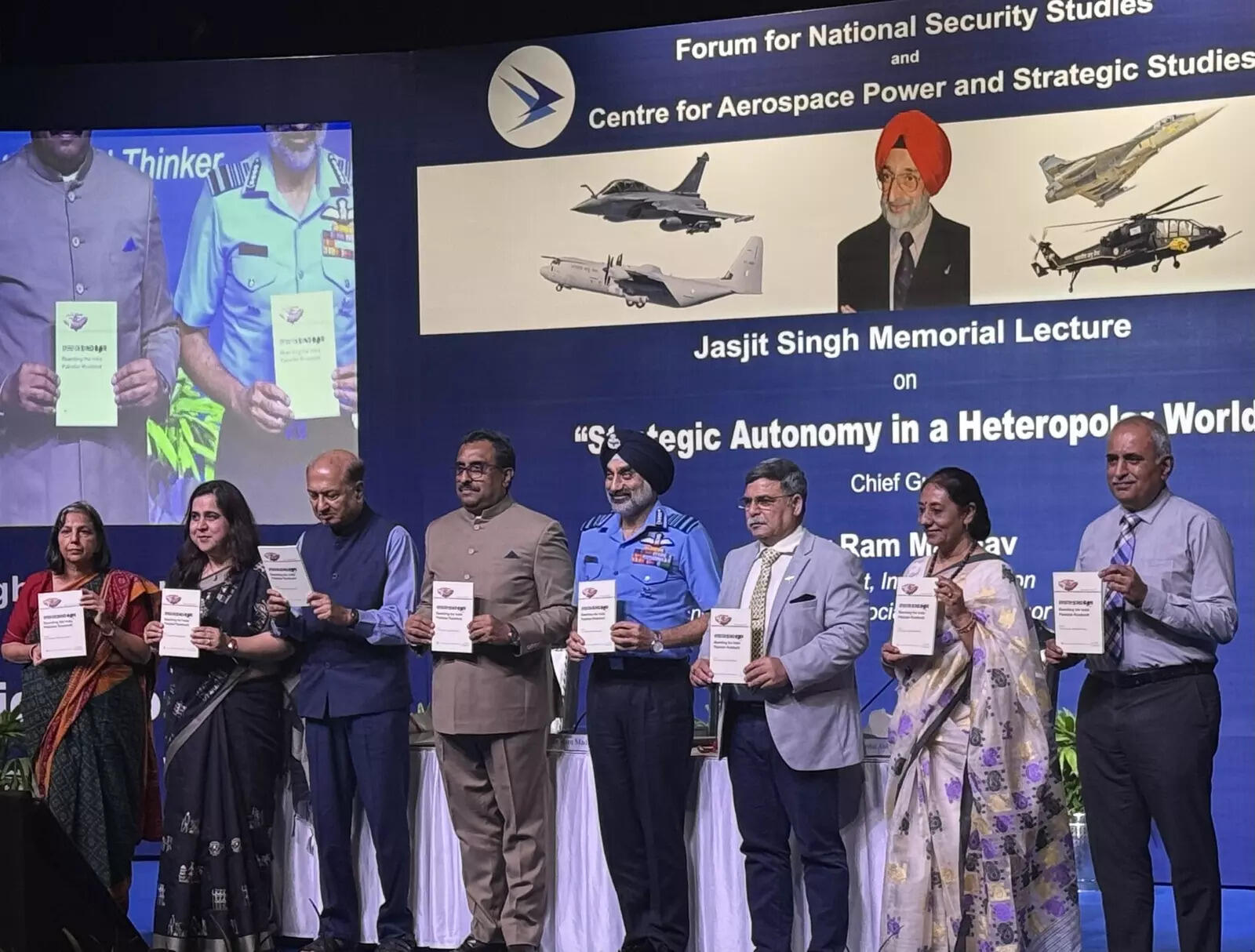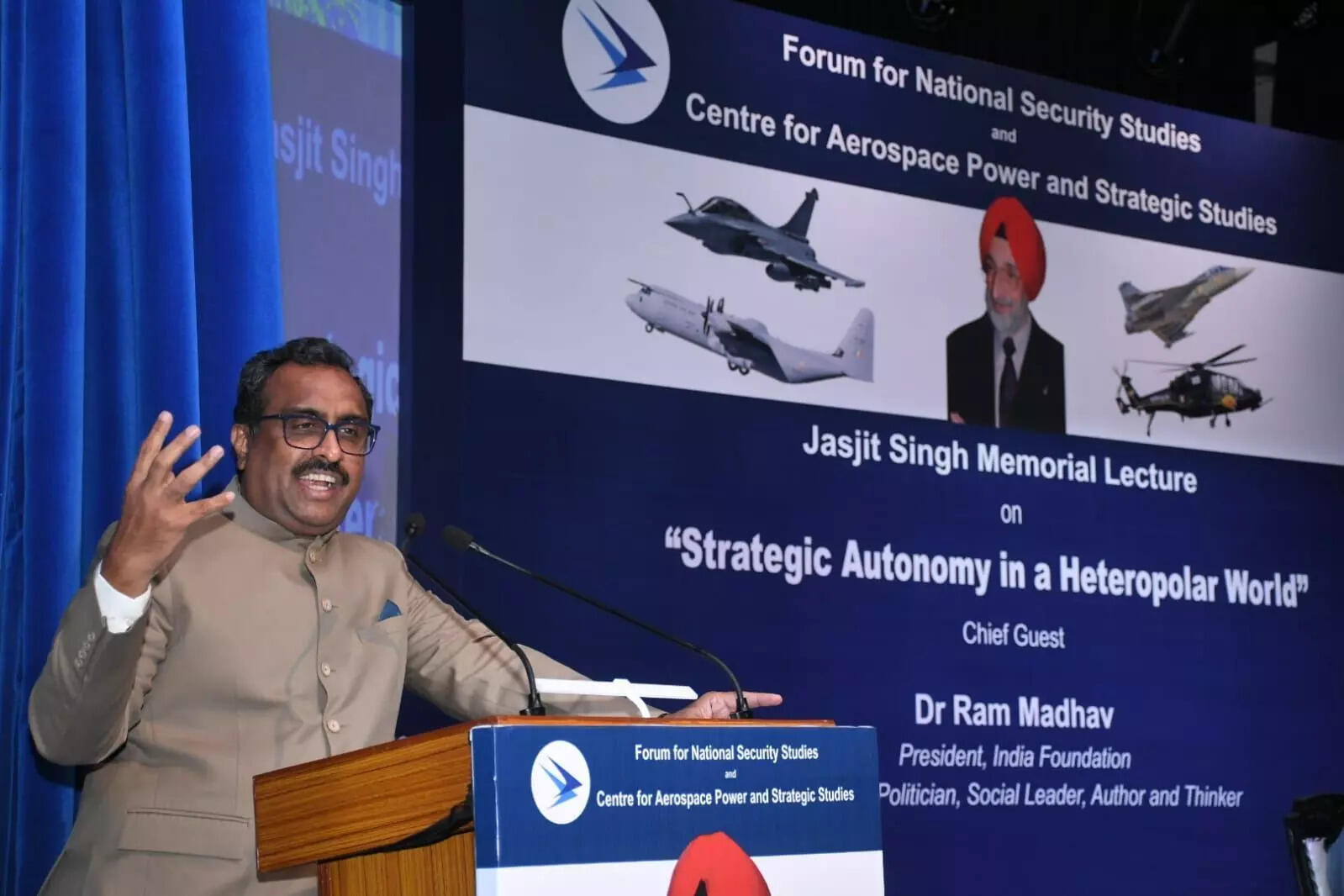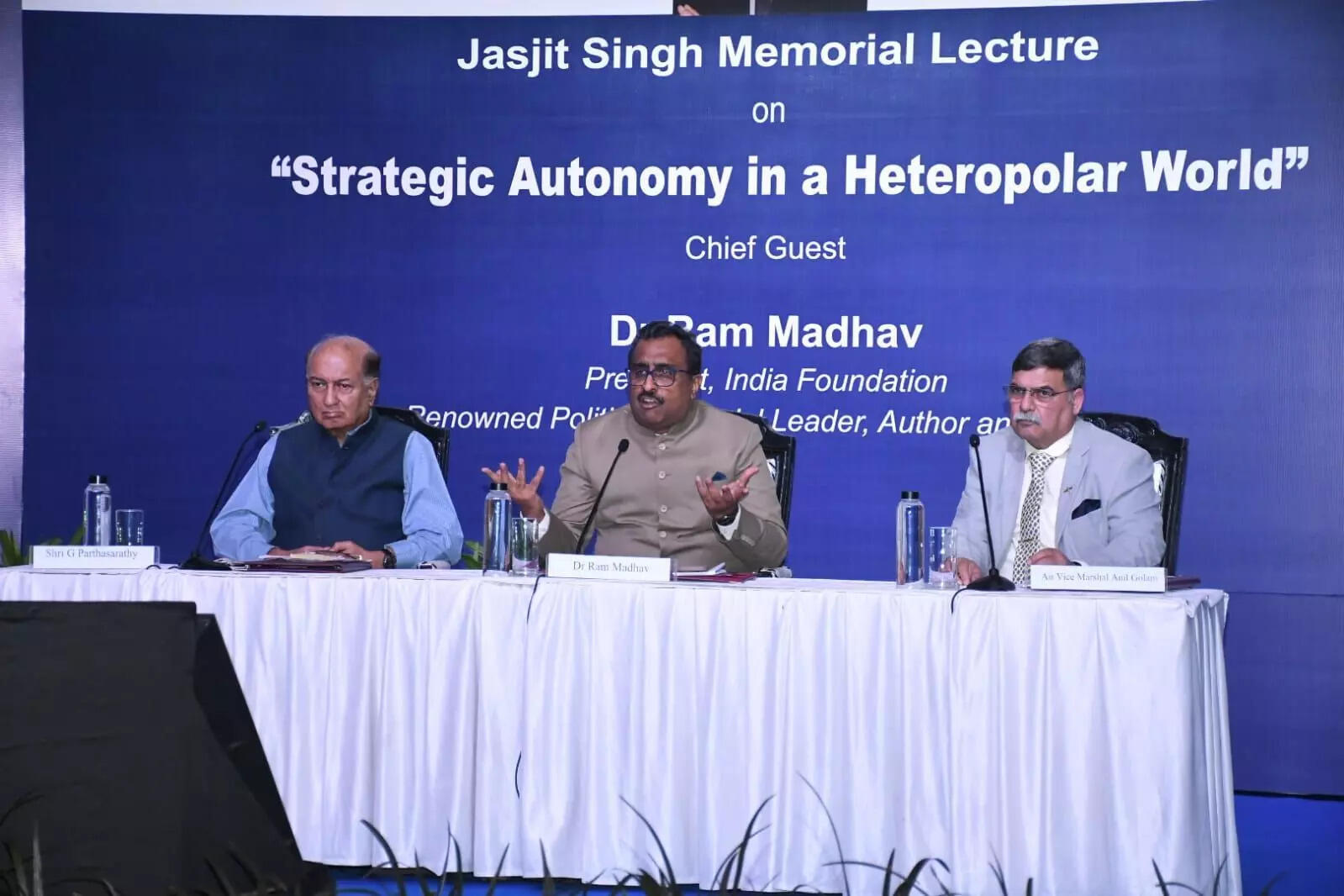
At a time when the global order stands fractured and uncertain, Dr. Ram Madhav, President of the India Foundation, delivered a thought-provoking and urgent call for a reimagining of multilateralism and strategic autonomy during his keynote address at the 8th Jasjit Singh Memorial Lecture organized by the Centre for Air Power Studies (CAPS) in New Delhi.
The annual lecture commemorates the enduring legacy of Air Commodore Jasjit Singh, one of India’s foremost military strategists and institution-builders. The event began with a welcome address by Air Vice Marshal Anil Golani (Retd), Director General of CAPS, followed by remarks from session chair G. Parthasarathy, India’s former High Commissioner to Pakistan and Australia.
Chief of the Air Staff, Air Chief Marshal Amar Preet Singh, PVSM, AVSM, was present at the event and felicitated Dr. Ram Madhav following his lecture, which was attended by senior officers from the three services, defence attachés, media professionals, strategic experts, and retired military personnel.
Remembering a Philosopher-Soldier
Air Commodore Jasjit Singh joined the Indian Air Force in 1956, graduating with the prestigious Jodhpur Sword of Honour. He was thrice decorated by the President of India—for gallantry during war, for distinguished service, and for his lasting contribution to the Indian Air Force. After an illustrious career, he served as Director General of the Institute for Defence Studies and Analyses (IDSA) from 1987 to 2001 and later founded the Centre for Air Power Studies.
Paying tribute to him, Ram Madhav remarked, “Jasjit Singh belonged to a rare class of philosopher-soldiers—those who shape not just military doctrine, but the very architecture of strategic thought. He saw national security not merely through the crosshairs of conflict, but through the wide lens of civilizational purpose.”
Drawing inspiration from Singh’s dual commitment to field command and scholarly inquiry, Madhav used the platform to issue a strong critique of the post-war multilateral system and call for an assertive Indian strategy grounded in realism.
The End of an Era
“We are living through the interregnum of history,” Madhav declared. “The world order built 75 years ago—post World War II—is collapsing. The institutions that once promised peace and order now appear hollow. The new has not yet taken shape, but the old is clearly failing.”

Madhav traced the architecture of contemporary multilateralism to the Bretton Woods system and the founding of the United Nations in 1945. But, as he pointed out, these institutions were never meant to be democratic. “The global order was constructed by the victors of the Second World War—primarily the United States and its Western allies—not to uplift the world, but to entrench their dominance.”
He noted how the leadership of key institutions such as the IMF and World Bank has remained under Western control for decades, with the IMF traditionally headed by a European and the World Bank by an American. “If this is truly a multilateral order,” Madhav asked, “why is its leadership monopolised by two regions?”
Even the World Trade Organization, he said, was an afterthought, cobbled together only in 1995 after decades of opposition by American corporate lobbies. “The U.S. rejected the idea of an International Trade Organization in 1948. Instead, they gave us the weak framework of GATT. Multilateralism, as we know it, was born with structural bias.”
The Collapse of Credibility
Madhav minced no words in outlining the dysfunctionality of these global institutions in today’s world. He cited the inability of the UN Security Council to act decisively in the Russia-Ukraine conflict, and the repeated failure of the UN to enforce its own resolutions—such as on Kashmir—as examples of how broken the system has become.
“Between 1948 and 1971, the Security Council passed 18 resolutions on Kashmir. Ask yourself—can you name even one that made a difference?”
He quoted UN Secretary-General António Guterres’ 2023 address, where the latter acknowledged that “multilateralism has failed” and proposed that the world now faces a stark binary: “Reform or rupture.”
But Madhav was sceptical even of reform. “Can we truly believe that an expanded Security Council with ten permanent members would function any better than the current one? The structure is beyond repair.”
Strategic Autonomy in an Age of Disruption
Against this backdrop, Ram Madhav proposed an alternative doctrine: strategic economy and strategic autonomy as guiding principles for India’s foreign policy in a transitional era.
“Non-alignment was the doctrine of the Cold War—defensive, binary, and overly romantic. Strategic autonomy is different. It is assertive, interest-based, and flexible. It means being wherever we need to be—QUAD, BRICS, or G20—based on national interest, not inherited ideology.”
He cautioned against India’s traditional tendency toward idealism in foreign affairs. “We must move from being moralistic to being realistic. You cannot hold back a tiger by grabbing its tail. Once you grab it, you cannot let go, and you cannot control it either. That is the danger of romanticism in a world driven by realpolitik.”
In this light, India’s refusal to become a pawn in global power blocs is not a retreat into isolationism, but a bold assertion of its sovereignty. “Strategic autonomy is not non-engagement. It is selective engagement on our terms.”
China’s Shadow and the Illusion of Global Commons

Madhav warned that while the West is mired in bureaucratic inertia, China is actively building an alternative global order. Through initiatives such as the Belt and Road Initiative, the Global Development Initiative, and the Global Security Initiative, Beijing is filling the vacuum left by Western inaction.
“In 2021, China pledged $1 trillion in aid and loans to developing countries—not as charity, but with strings attached. From surveillance infrastructure to ideological compliance, there are hidden costs to this largesse.”
He pointed to China’s growing presence in multilateral institutions: “In many UN agencies today, the top positions are held by Chinese officials. They are already setting global norms—one rule at a time.”
Madhav warned that if India and like-minded nations do not lead the conversation on reimagining multilateralism, the alternative could be shaped by authoritarian forces.
From Reformation to Reimagination
The speech culminated in a powerful appeal for a fundamental rethinking of global governance.
“We speak of reforming the United Nations. But reform is not enough. We must have the courage to reimagine the entire structure. If the League of Nations failed, the United Nations is faltering, what comes next? We need to ask—not merely how to fix the old order, but how to build the new.”
Calling for a new Atlantic Charter moment—akin to the Roosevelt-Churchill vision that laid the foundations of the UN—Madhav said it was time for India to assume the role of an architect, not just a critic. “The world is changing. Let us not be passive observers. Let us be among those who write the next chapter.”
In concluding, Ram Madhav quoted an old adage: “These institutions were not created to take us to heaven, but to save us from hell. Today, they are failing even in that modest task.”

